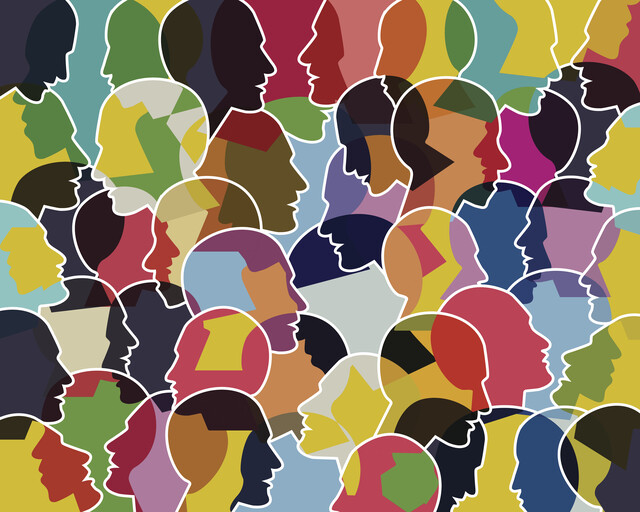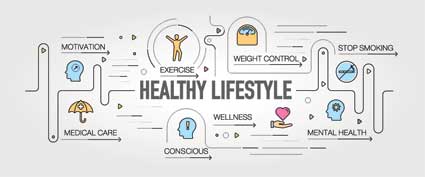Information enters our brain through our five senses: sight, hearing, touch, taste, and scent. Memory stores our recollections of each of these senses, not the sensations themselves. Recalling memories retraces the same neural pathways in the brain that we originally used to experience an event, creating a sort of "recall" of the event.
There are two different kinds of memory the brain stores � short-term memory and long-term memory. When we experience an event, it actually lasts only a fraction of a second, then moves into short-term memory for a period of time in the cortex of the brain. Eventually, the most essential memories move from short-term memory to long-term memory. In fact, short-term memories last less than a minute. The greater part of anything that you do during a day is lost from your short-term memory within a minute of having done it.
Some of the information � what your brain deems the essentials � will be retained and stored in your long term-memory. Many of these memories will last a lifetime; others will eventually be forgotten, but are retrievable in some cases.
Long-term memories are created through a three-step process, so that each memory can be properly broken down into parts and assigned meaning, stored properly, and then retrieved when needed. The shorthand for this process is:
Encoding ? Storage (or Consolidation) ? Retrieval
Encoding is simply breaking down any new concept or information into parts that will establish meaning.The brain will also establish a context around the new information or experience. Encoding is what gives the new information individual meaning; it will define the new information in terms of descriptive elements, such as the taste, sound, appearance, and feel. A sweater might by warm, bright, and colorful. It can also be encoded in the context of particular feelings or emotions, "I love this sweater because it was a gift from my husband and I look good in it."
Storage is the brain's act of "filing" the memory somewhere. We usually store memories with similar information, which is why it is sometimes referred to as consolidation. You may remember the new sweater as "just like the fuzzy sweater I had when I was a teenager." You are classifying it by consolidating it with an object that is similar but with some characteristics that are different. This helps us store memories in a less chaotic fashion and helps us with the final stage of memory retrieval.
Retrieval of a memory involves following the "clues" that trace the various encoded signs, and then decoding the information to get to the meaning. Sometimes we can't retrieve exactly what we are struggling to recall ("It's right on the tip of my tongue."), but we know we are very close, because we can retrieve other information that is very close � we can remember sweaters that are similar and we may even close our eyes and we can remember a particular color, but that one sweater � the one your husband gave you � is an elusive memory. But those memories consolidated with it may help you to get where you are going, so that you can get to the whole memory.
We use the hippocampus, a sub-portion of the cortex of the brain, to consolidate new memories. Any new event creates brief links among neurons in the cortex of the brain. For instance, when you remember the sweater your husband gave you, the textural memory of how it feels, the emotional memory of why you love it, and the visual appeal memory will all converge in the hippocampus. Each time this happens, the path of neurons creating the memory is strengthened as it passes through the cortex and hippocampus. The more this happens, the more the memory is strengthened by reinforcement of those pathways. These memory paths become a stable part of long-term memory.
It would be nice to remember everything, but it would give us a terrible overload, taking over so much of our brain that it couldn't take care of the many other functions it has to take care of -- from involuntary actions, such as breathing and blinking, to conscious thought, such as conversation and processing new ideas. Simply put, we can only retain so much, and our brain is selective, so that we remember only what it thinks we need.
Many factors affect how much and how well we can recall things, including how much we are paying attention when we encounter the material. When we say information "went in one ear and out the other," (a common affliction of teenagers), we usually mean that the person appeared to be paying attention, but later remembered nothing they were told. This is because the person listening wasn't really paying attention to what we were saying at all (another common affliction of teenagers).
These same teenagers can remember the lyrics to hundreds of popular rock songs, the names of band members, and concert dates for the coming two years. Why? Because this is the information that is important to them. They are motivated to remember it and store it in their long-term memory for reference whenever they need it. The list of chores you gave them, however, isn't memorable, because they just don't find it interesting or important.
Our emotional state has a distinct effect on memory. The greater the emotion or intensity of a particular event, the more likely it is that you will remember the information and events surrounding it. Whether your heightened mood is good or bad, whether you are happy or sad, joyful, angry, frightened, or grieving, doesn't matter nearly as much as the intensity or depth of that particular feeling. This is why so many people can recall years later where they were, what they were wearing, and how everything looked on their wedding day, when their child was born, or at the funeral of someone they loved.
Did You Ever Really Learn It?
There are levels to what you've learned in working memory. Recent studies done at Penn State University Erie revealed that some individuals can't retrieve information from their memories, because it was only stored in working memory (another term for short-term memory), and never actually converted to long-term memory. In effect, the information was never actually converted from new, learned information, to a permanent memory that could later be retrieved.
In the study, participants fell into two types of groups. One group learned the new information for a brief time and then forgot it � the information was gone for good. The other group was able to encode the information and put it into storage for future retrieval.
Another discovery was that the brain has an override system that effectively "trashes" information that it deems outdated. While study participants were learning information, if new details were revealed, the brain seemed to filter through the details and retain only what it deemed most vital. It would encode and store the most important bits of information and "toss aside" the rest, because it recognized certain information as no longer necessary or relevant.
We can improve our memory by learning a variety of memory-enhancing skills, but nothing will improve our memory, if we don't take care of our bodies and our minds. All of the skill in the world doesn't help, if the basic building blocks � a healthy body and a fit mind � aren't there.
For years, scientists have been studying the way the brain works and how memory is affected by everything from sleep, to our eating habits -- and they have come up with some startling results. How we take care of ourselves does affect how well we can remember things. Keep in mind, however, that there are many supplements unscrupulous companies advertise as "miracle cures" that don't deliver the results promised.
Promises vs. Results
The problem with determining whether a particular supplement, vitamin, herb, or food can improve memory is that it's difficult to test the desired result. The long-term results take years, or even decades, to determine and the results are extremely subjective. Who knows how much a particular person would have remembered without taking a particular supplement? We can make comparisons between large groups of people, but this is only a generalization, and there are lots of variables to take into consideration. This is why you will often find contradictory information on whether a particular supplement has any effect on memory. What we do know is there is more evidence in regard to some supplements than others.
-
- The evidence is accepted by the majority of medical doctors and healthcare practitioners.
- There are generally no major side effects that are a cause for concern.
- There have been numerous clinical trials.
- The suggestions are practical and easy to implement in your daily life.
Of course, you should always talk to your doctor before adding anything to your healthcare routine.
First, Let's Get Healthier
The typical adult should be getting between seven and nine hours of sleep a night for his or her brain to be operating at optimal efficiency. There are exceptions � some people can function fine on four or five hours sleep each night, while others need 10 hours every night. Only you can determine how much you need. If you go to bed at around the same time each night and can wake up around the same time each morning without an alarm clock going off, you are getting enough sleep, otherwise�Well, you need to think about getting more rest.
Maintaining proper body weight and exercising regularly also improve memory function. It seems there's no way around it � you have to be active and eat right. In fact, there are specific foods such as certain fishes that are considered "brain foods" that we will be talking about later in this chapter. Exercise improves brain function by increasing blood flow to the brain. With more blood flow, you'll be able to concentrate better, which means you'll be able to remember more. It's the way your body is designed � there's a unique balance between the body and mind that's truly dynamic.
Supplements
You get most of vitamins and minerals you need from the foods you eat or from (hopefully) a multi-vitamin and mineral supplement you take each day. Some vitamins have a particularly beneficial effect on memory and intelligence and can, if taken regularly, improve thinking and memory:
Vitamin B6 � This vitamin is essential to the production of neurotransmitters in the brain, which are central to the process of encoding and storage of memories. Foods that contain B6 include cereal grains, pasta, tuna, bananas, spinach, and peppers.
Vitamin B12 � A vitamin central to the production of acetylcholine, an essential neurotransmitter used in the formation of memories. Foods that are rich in B12 include any meats, eggs, dairy products, and fish. Many soy products, such as soy milk and tofu, are also fortified with the vitamin.
Folic Acid � This is sometimes called folate, and it also aids in the production of a specific neurotransmitters. It also aids in sharpening thought processes and concentration. It's found in whole grain foods, broccoli, dark green, leafy vegetables, nuts and seeds, and sprouts.
Vitamin E � Vitamin E is a powerful antioxidant that has been proven to stave off the decline of memory loss in the elderly. In fact, the effect of Vitamin E on memory may have the greatest clinical backing of any of the vitamins. Clinical research has shown consistently that taking between 200 and 250 milligrams of Vitamin E daily decreases memory loss by up to 30 percent in some cases. There have also been case studies that suggest Vitamin E regimens may delay the onset and progression of Alzheimer's disease in some patients. The best sources of Vitamin E include green vegetables, vegetable oils, and eggs.
DHA � DHA is a class of Omega-3 fatty acid that is essential to brain function. These fatty acids protect brain cells and improve both memory and cognitive skills. The greatest source of DHA is cold water fish, such as mackerel, herring, salmon, or fish oil. Unfortunately, to get sufficient DHA in their diet, typical Americans would need to quadruple their intake of fish. However, fish oil capsules can easily be taken daily to supplement the diet and get the same beneficial effects. Another good source of DHA is olive oil.
Lecithin � Lecithin can be taken as a supplement or added to your food as a granulated additive. It's a lipid (a fat found in living cells) that is key to the function of neurons and red blood cells. One unique characteristic of lecithin is that the results of taking it are almost immediate; when you take lecithin, it almost immediately passed the blood/brain barrier and enters your brain, where it immediately begins having an effect on how your brain functions. If you start taking lecithin this week, you should begin to see an improvement in cognitive function and memory within days.
Ginkgo Biloba � This is one of the most widely touted herbal supplements for improving memory. Unlike the other supplements mentioned here, your body doesn't need ginkgo biloba at all. It isn't something that, like omega-3 fatty acids or vitamins, your body needs in even trace amounts. But in China, people have been using the leaves of this tree for thousands of years to improve memory, and western medical studies have proven its effectiveness.
There are actually several reasons to take ginkgo biloba. The human body benefits a great deal from this herbal supplement:
- It increases blood flow to the brain and other organs.
- It helps regulate neurotransmitters.
- It enhances memory retention and cognitive function.
- It is a powerful antioxidant.
As always, be sure to talk to your physician before adding any supplement, including ginkgo biloba, to your healthcare routine.
Too Much of a Good Thing?
Always talk to your doctor before taking any type of supplement. It's also important to be aware of the potential for side effects and overdosing. In some cases, such as with a vitamin, you may be fine when you take more than the recommended daily allowance; in others you may find that you become sick to your stomach -- or worse -- if you go far beyond the recommended dosage. Too much of anything is not a good idea. Follow the dosage guidelines carefully and consult your doctor to make sure nothing you take will interact adversely with any medications you are currently taking.































